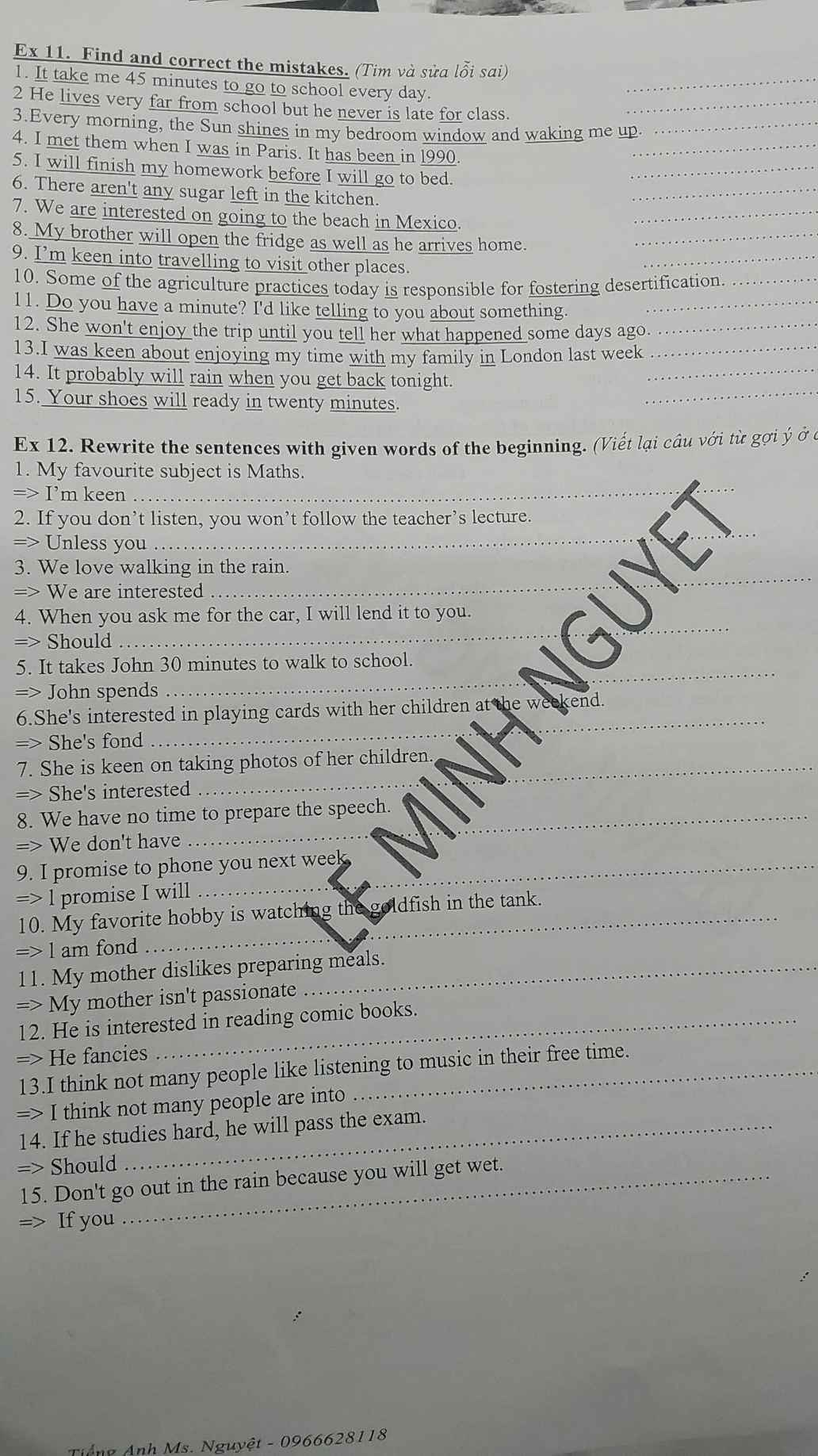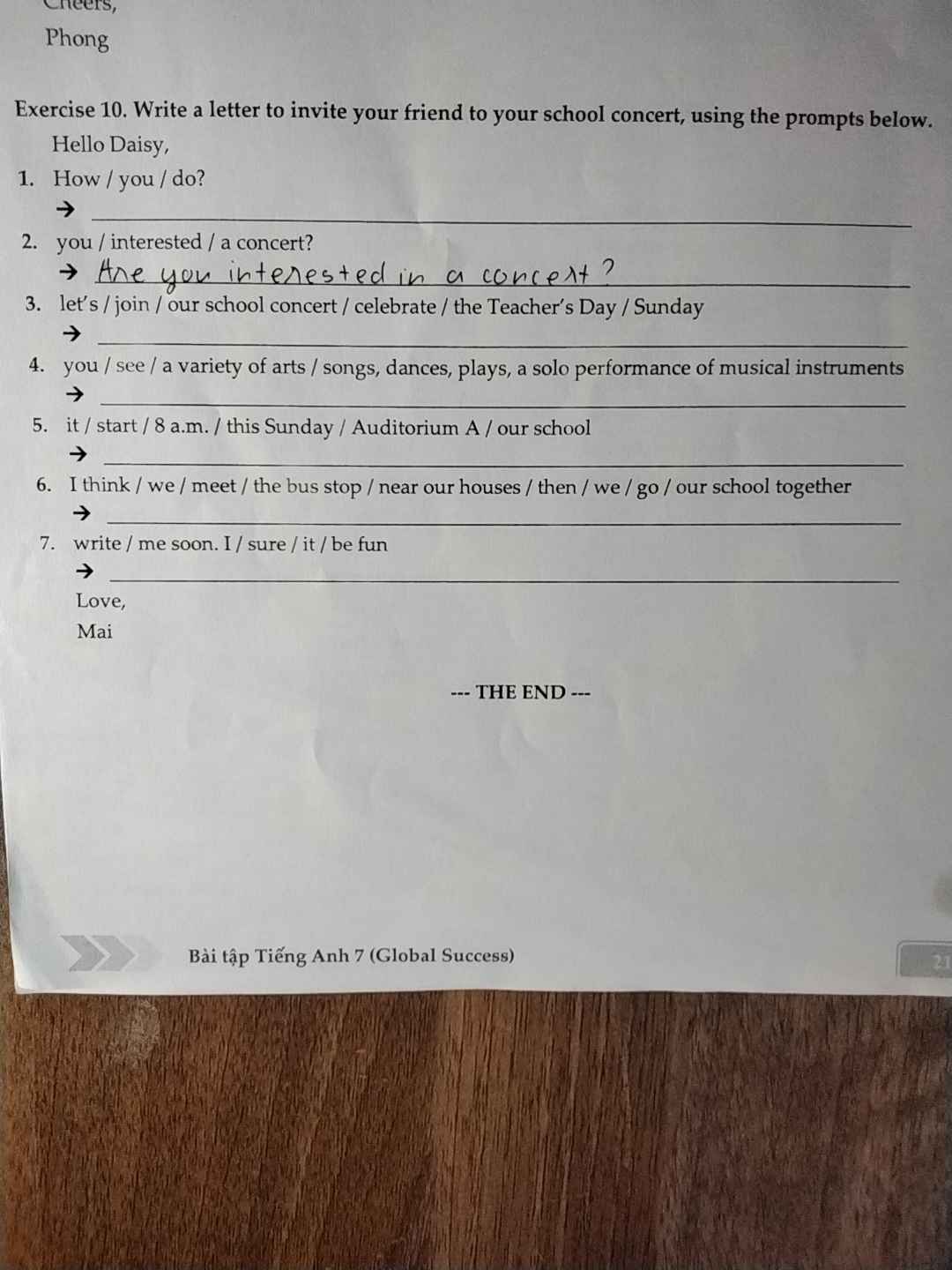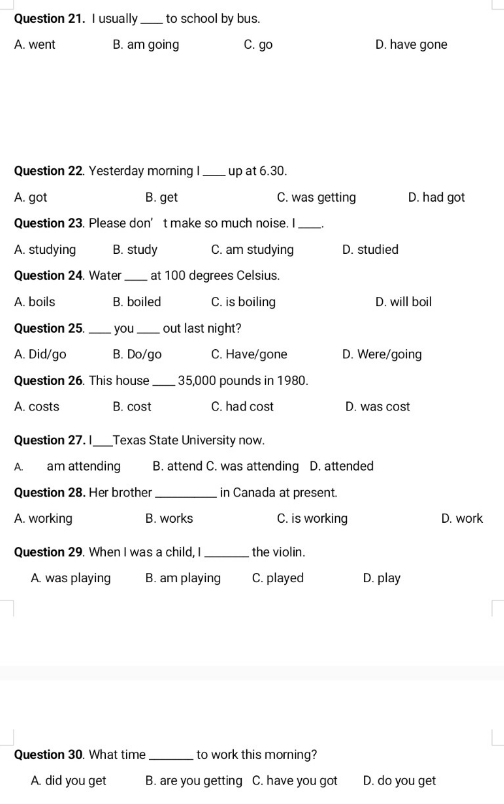 giúp milk với aaaaa milk c.on
giúp milk với aaaaa milk c.on
Hãy nhập câu hỏi của bạn vào đây, nếu là tài khoản VIP, bạn sẽ được ưu tiên trả lời.


1 T (give benefits to others = help others)
2 F (you do not get paid to perform community service)
3 F (Community service can help many different groups of people: street children, disabled people, even animals and the environment)

1 How do you do?
2 Are you interested in a concert?
3 Let's join our school concert to celebrate the Teacher's Day on Sunday
4 You will see a variety of arts, songs, dances, plays and also performances of musical instruments
5 It starts at 8 a.m this Sunday at the Auditorium A of our school
6 I think we will meet at the bus stop near our houses and then we will go to our school together
7 Write to me soon. I'm sure it will be fun

1 studies - will pass
2 don't take - will get
3 arrives - will reach
4 isn't careful - will get
5 rains - will stay
6 will win - practice
7 won't go - doesn't finish
8 will buy - save
9 will be - receive
10 won't pass - don't study
11 arrive - will catch
12 studies - will pass
13 don't hurry - will miss
14 finishes - will go
14 rains - will stay

Trong tiếng Anh, cụm từ "charity organization" hay "charitable organization" thường được dùng để chỉ các tổ chức từ thiện. Việc đặt từ "charity" (hoặc "charitable") trước "organization" không phải là ngẫu nhiên, mà có lý do dựa trên quy tắc ngữ pháp và cấu trúc từ của tiếng Anh. Dưới đây là một số lý do vì sao từ "charity" đứng trước "organization":
1. Quy Tắc Ngữ Pháp:- Tính từ đứng trước danh từ: Trong tiếng Anh, tính từ thường đứng trước danh từ mà nó mô tả. Từ "charity" là tính từ trong cụm từ "charity organization", và nó mô tả loại tổ chức mà chúng ta đang nói đến. Do đó, "charity" đứng trước "organization".
- Cấu trúc danh từ + danh từ: Trong tiếng Anh, khi hai danh từ kết hợp với nhau, danh từ đầu tiên thường làm tính từ mô tả cho danh từ thứ hai. Trong cụm từ "charity organization", "charity" (từ loại danh từ) được sử dụng như một tính từ để mô tả loại tổ chức mà "organization" đại diện.
- Chỉ loại hình hoặc chức năng: "Charity" chỉ ra loại hình hoặc chức năng của tổ chức. Từ này làm rõ rằng tổ chức này có mục đích từ thiện. Vì vậy, "charity" đứng trước "organization" để chỉ rõ rằng đây là một tổ chức từ thiện.
- Cung cấp thông tin ngay lập tức: Việc đặt từ "charity" trước "organization" giúp người đọc hoặc người nghe nhanh chóng nhận biết rằng tổ chức đang được nói đến có mục đích từ thiện, không phải một loại tổ chức khác.
-
"Charity organization": Đây là tổ chức chuyên hoạt động từ thiện, cung cấp sự giúp đỡ và hỗ trợ cho những người cần.
-
"Charitable organization": Tương tự như trên, cụm từ này cũng chỉ tổ chức từ thiện nhưng sử dụng tính từ "charitable" để làm rõ mục đích từ thiện của tổ chức.
Trong tiếng Anh, từ "charity" đứng trước "organization" theo quy tắc ngữ pháp, vì "charity" hoạt động như một tính từ mô tả cho "organization". Cách sắp xếp này giúp làm rõ loại hình tổ chức và đảm bảo rằng thông tin được truyền đạt một cách chính xác và dễ hiểu.

17 People in the countryside do not have much stress
18 We eat a lot of garlic to prevent the flu
19 Green tea is a popular drink in my country
20 You can use eyedrops for your tired eyes
21 Doing housework is a kind of exercise
22 Reading in dim light harms your eyes
23 Cold weather causes skin and chapped lips
24 My dad never works on the weekends
25 Mary brushes her teeth twice a day

42 You shouldn't swim immediately after a meal
43 You should take this medicine three times a day
44 You should listen to the weaher forecast before going camping
45 You should take exercise everday
46 You shouldn't drink the water there because it will make you ill
47 You should speak English everyday
48 You should walk in the morning
49 You should plant some trees
50 You should not swim in this dirty river

1. I found the film so interesting that I couldn't take my eyes off the screen.
A. gripping
B. shocking
C. tiring
D. boring
2. I am very much interested in learning more about ecotourims and its benefits.
A. problems
B. dangers
C. advantages
D. issues
3. Renewable sources are available, clean and safe but they are expensive to produce.
A. adundant
B. wasteful
C. cheap
D. dangerous




Ex. 11 :
1. take -> takes
2. never is -> is never
3. waking -> wakes
4. has been -> was
5. will go -> go
6. aren't -> isn't
7. interested on -> interested in
8. as well as -> as soon as
9. keen into -> keen on
10. is -> are
11. telling -> to tell
12. what happened -> what had happened
13. was keen about -> was keen on
14. probably will -> will probably
15. will -> will be
Ex.12 :
1. I'm keen on maths.
2. Unless you listen, you won't follow the teacher's lecture.
3. We are interested in walking in the rain
4. Should you ask me for the car, i will lend it to you.
5. John spends 30 minutes to walk to school.
6. She's fond of playing cards with her children at the weekend.
7. She's interested in taking photos of her children.
8. We don't have any time to prepare the speech.
9. I promise I will phone you next week.
10. I am fond of watching the goldfish in the tank.
11. My mon isn't passionate about preparing meals.
12. He fancies reading comic books.
13. I think not many people are into listening to music in their free time.
14. Should he studies hard, he will pass the exam.
15. If you go out in the rain, you will get wet.